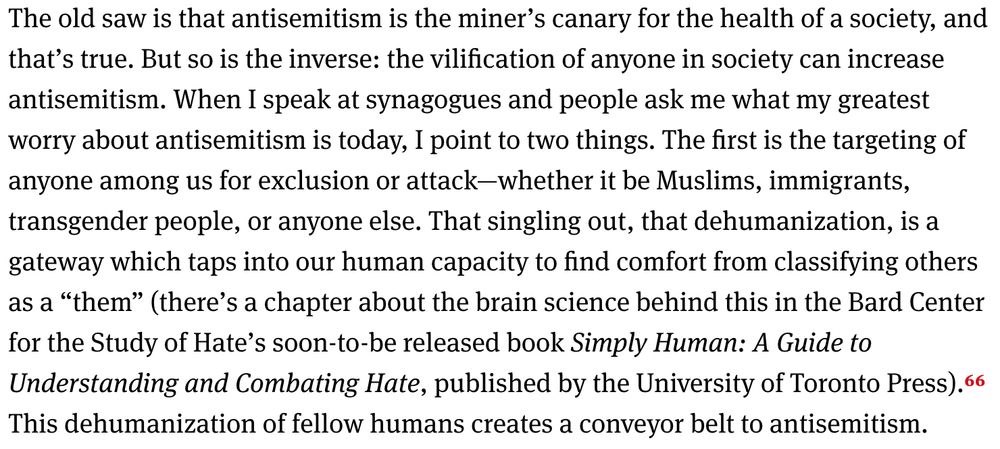Katy Glenn Bass
@katygb.bsky.social
2.5K followers
630 following
130 posts
Research Director, Knight First Amendment Institute at Columbia University
Posts
Media
Videos
Starter Packs
Reposted by Katy Glenn Bass
Reposted by Katy Glenn Bass
Katy Glenn Bass
@katygb.bsky.social
· Sep 5
Reposted by Katy Glenn Bass
Katy Glenn Bass
@katygb.bsky.social
· Sep 2













![Democratic values are also jeopardized by the degree to which private companies will exercise governing power over users in the LMA economy. LMAs are likely to become the principal means by which we interact with digital technologies [79, 82]. This could be profoundly empowering. But on our present trajectory we are likely to interact primarily with platform agents owned by the major digital platforms, which monitor and govern our behavior in much the same way existing algorithmic intermediaries do—except instead of only governing us when we interact with their platform, they will become universal intermediaries, that mediate all of our digital activities [80]. This is likely to mean that they have even more pervasive control over what will be an even greater proportion of our lives. This will further increase our collective heteronomy. Of course, this risk could be substantially diminished if an effective marketplace of LMAs exists, in which users can easily switch between different agents and at least some agents exercise power reasonably [80]. The precedent of the consolidation of digital platforms, however, suggests that this kind of genuinely competitive agent marketplace is unlikely to persist for long without robust, intentional support](https://cdn.bsky.app/img/feed_thumbnail/plain/did:plc:rbpwp77ohpayefrf4nvujree/bafkreifmh2r2cbz2vapwgkxa7xjs3t2qqmtyradahjl2g45346bejfxoxq@jpeg)
![This paper is an exercise in “anticipatory ethics”[62]: the project of identifying ex ante the likely ethical questions raised by new technologies, and using that knowledge to shape those technologies for the better [75]. 15. For a complementary discussion of “sociotechnical speculative ethics,” see [44]. For a general articulation and defense of anticipatory AI ethics, see [74].This paper does not aim to forecast the net impact of LMAs on society, taking into account all of the possible positive and negative effects, weighting them for their probability, and summing them all together. Instead, it aims to identify the features of capable AI agents that, given the environment into which such systems will be deployed, are likely to be either societally beneficial or else harmful. The goal is not to make an all-things-considered prediction, but to highlight discrete hazards and opportunities that can be mitigated or exploited when designing and deploying these systems.](https://cdn.bsky.app/img/feed_thumbnail/plain/did:plc:rbpwp77ohpayefrf4nvujree/bafkreieaxobsq7m6bj6berbw3wzy3qqjyxg37sgd447o7decguo4ux7w7m@jpeg)


![A screenshot of page 28 of a legal document discussing the difficulty lower courts face when interpreting unclear or rapidly evolving guidance from the Supreme Court.
The following phrases and sentences are highlighted in yellow:
* "That said, the Supreme Court’s recent emergency docket rulings regarding grant terminations have not been models of clarity, and have left many issues unresolved."
* "California was a four-paragraph per curiam decision issued in the context of a stay application."
* "The outcome, which no party had requested, was, thus, inconsistent with the views of eight justices"
* "the issues are complex and evolving."
* "this Court, not the district courts or courts of appeals, will often still be the ultimate decisionmaker as to the interim legal status of major new federal statutes and executive actions."
* "...it is unhelpful and unnecessary to criticize district courts for “defy[ing]” the Supreme Court when they are working to find the right answer in a rapidly evolving doctrinal landscape, where they must grapple with both existing precedent and interim guidance from the Supreme Court that appears to set that precedent aside without much explanation or consensus."](https://cdn.bsky.app/img/feed_thumbnail/plain/did:plc:sefgphqp2xqwh2hawaixykwz/bafkreigccsnzzzeeozgxugdllvfylmdjlrmifsf34rgsubkhl5f2viivzu@jpeg)
